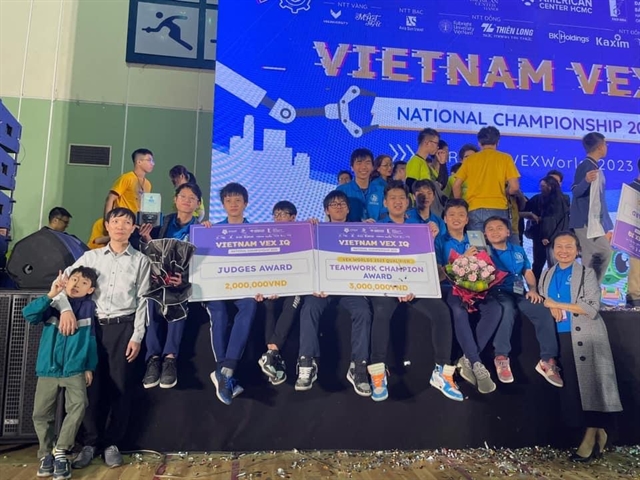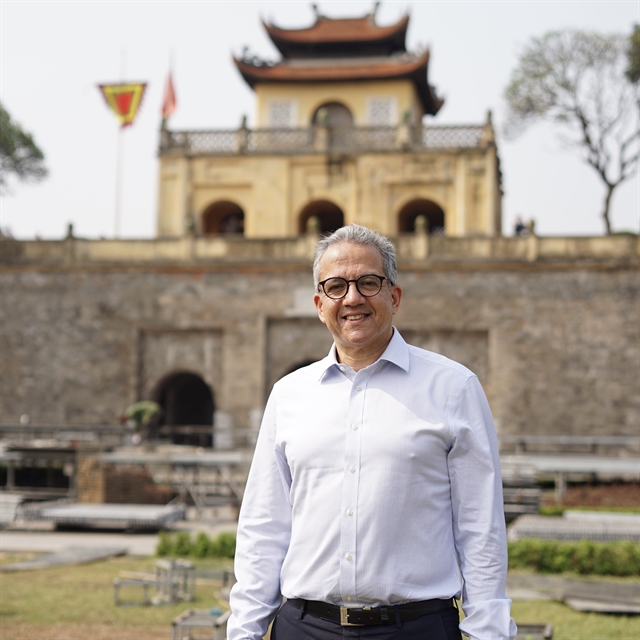 Opinion
Opinion


|
| Dr Khaled El-Enany, an Egyptologist and former Minister of Tourism and Antiquities who is Egypt’s candidate for the post of Director-General of UNESCO at the Imperial Citadel of Thăng Long during his visit to Việt Nam from April 23-24. Photo courtesy of Khaled El-Enany |
Việt Nam News reporter Khánh Linh speaks with Dr Khaled El-Enany, an Egyptologist and former Minister of Tourism and Antiquities who is Egypt’s candidate for the post of Director-General of UNESCO.
Following his recent tour of Việt Nam from April 23 to 24 to promote his campaign under the slogan 'UNESCO for the People', El-Enany shared his views on the important role of Việt Nam in his outreach efforts, the growing voice of Asian countries within UNESCO and his vision for the organisation’s future, with a strong emphasis on inclusivity, dialogue and strengthening multilateral cooperation.
Việt Nam holds a special place in your campaign. What role do you see for Việt Nam in UNESCO’s future, especially in strengthening cultural and scientific cooperation?
Coming here as a candidate for Director-General of UNESCO, on the eve of the 50th anniversary of the end of the war in Việt Nam, was more than symbolic. It was a powerful moment for me personally, because that is precisely what UNESCO was founded to protect: peace.
I must also say that I was deeply touched by the warmth and generosity extended to me during my visit to Hà Nội. I am sincerely grateful to the Vietnamese authorities for organising a thoughtful and comprehensive programme — one that was rich in both substance and spirit.
The visit allowed me to experience first hand the depth of Việt Nam’s cultural heritage, and to gain valuable insight into the country’s priorities within UNESCO. Việt Nam is not only an important member of the organisation; it is an active and committed one — playing a vital role in shaping UNESCO’s work across sectors.
Scientifically, the country is particularly vulnerable to the climate crisis, with over 3,000 kilometres of coastline facing threats from typhoons, flooding and coastal erosion. I believe UNESCO must place ocean protection and biodiversity at the core of its mandate, and Việt Nam is well positioned to lead, not just regionally, but globally. These challenges demand stronger international scientific cooperation. If elected, I will prioritise direct engagement with countries most vulnerable to these threats, to co-create strategies rooted in shared knowledge and open science.
Culturally, Việt Nam offers a compelling model of how heritage preservation can drive sustainable development. The way intangible traditions like ca trù (musical storytelling) and xoan (traditional singing and performances) have been integrated into education and cultural tourism is exemplary. I want to ensure that countries like Việt Nam are not only supported, but are empowered to shape the organisation’s future.
What made this visit especially meaningful was the opportunity to engage with a broad spectrum of people. These conversations touched on the future of education, science, culture and communication, and they reaffirmed my belief in the power of inclusive dialogue. It is through such exchanges that we build the foundation for shared solutions — and for peace.
Many Asian countries, including Việt Nam, are playing a bigger role in global affairs. How would you ensure that Asia’s voice is better heard and represented within UNESCO?
Asia’s growing influence on the world stage is not just a regional development — it’s a global opportunity. With its cultural depth, scientific innovation and economic dynamism, Asia has much to contribute to the multilateral system. At UNESCO, this must be reflected not only in how we set priorities, but in how we listen, collaborate and lead together.
I don’t believe in a world of competing blocs. I believe in a world of shared responsibility. Inclusivity isn’t about drawing lines between North and South, East and West — it’s about building a more balanced centre. That is what UNESCO must be: a meeting point for ideas, experiences and solutions that reflect the richness of our global diversity.
If entrusted with the role of Director-General, I am committed to creating a culture of active listening and genuine co-creation. That’s why I’ve pledged to engage in discussions with all Member States within my first 100 days in office — not simply as a symbolic gesture, but to listen, learn and open channels for long-term cooperation. Asia, with its many voices and perspectives, has a central role to play in shaping UNESCO’s future — not as a peripheral actor, but as a core architect of the multilateral system we need today.
Your campaign slogan is 'UNESCO for the People'. What does that mean in practice, and how would you bring it to life if elected?
'UNESCO for the People' is more than a slogan — it is a vision. It reflects my firm belief that UNESCO must be deeply connected to the lives, hopes and realities of the communities it serves. And this vision aligns closely with the spirit I witnessed in Việt Nam: a country where education, culture and community are not abstract ideals, but lived commitments.
To realise this vision, I will focus on strengthening UNESCO’s presence and impact at the local level — starting with empowering our field and regional offices. These offices are closest to the people and best positioned to understand the real needs on the ground. Việt Nam has shown the world how community-based heritage preservation and education reforms can inspire national pride and sustainable growth. That’s the kind of locally rooted success UNESCO must support and scale globally.
I also see digital technology as a key ally. In a country like Việt Nam — dynamic, young and increasingly tech-driven — we have enormous potential to use digital tools to connect, listen and act more quickly. By making sure knowledge flows from the field to UNESCO headquarters and back, we can respond more effectively to real-world challenges.
Finally, 'UNESCO for the People' means speaking with people, not just about them. We must communicate more clearly, more openly — especially with young people. That means celebrating local stories, listening to communities and ensuring that UNESCO is not just an international institution, but a partner in people’s lives.
UNESCO has a wide mission—from protecting heritage to promoting education and science. How would you help the organisation become more proactive and impactful in these areas?
UNESCO’s broad mandate is not a weakness — it’s a unique strength. Education, culture, science and information are not separate silos; they are deeply interconnected pillars that serve one shared goal: building peace and resilience by shaping minds, empowering communities and preserving humanity’s common legacy.
Việt Nam understands this better than most. From its commitment to inclusive education and scientific innovation, to its leadership in safeguarding intangible cultural heritage, Việt Nam has shown how integrated, community-driven approaches can make global principles locally meaningful.
To make UNESCO more impactful, we must first ensure these areas work in harmony — guided by a shared strategy, supported by strong partnerships and aligned with national priorities. I believe the organisation must also strengthen its place within the broader United Nations system, becoming a more agile and collaborative actor for sustainable development.
A key part of this is reinforcing UNESCO’s financial foundation. We need to diversify how we mobilise resources — reaching beyond traditional donors to engage private sector actors, philanthropic foundations and civil society. And we need more flexible funding — resources that can support long-term priorities and adapt to urgent needs, not just pre-defined projects.
But funding is only one side of the equation. The other is trust. That’s why I will prioritise transparency, efficiency and clear impact. People — including the people of Việt Nam — must be able to see how their support for UNESCO translates into real outcomes: schools that are more inclusive, heritage sites that are protected and revitalised and scientific knowledge that serves climate resilience.
As an Egyptologist and former Minister of Tourism and Antiquities, how has your background shaped your leadership style and vision for UNESCO?
I started my career as a tour guide, so promoting culture has always been at the heart of my work. That’s where my connection with UNESCO began -- in front of the Abu Simbel temples, which were saved from destruction thanks to a global campaign led by UNESCO. For me, that moment captured what UNESCO is all about: protecting heritage so it can be shared, understood and passed on.
Later, as Minister of Tourism and Antiquities, I carried that same conviction into public service. I led a sector with over 2,000 archaeological sites, 40 museums and a tourism industry employing over one million Egyptians. We merged two ministries into one to align heritage preservation with economic development, introduced performance-based planning and launched major projects like the Grand Egyptian Museum. We also built new funding models and expanded access to culture through digital platforms — not just to increase visibility, but to involve communities and reach wider audiences, including educators and people with disabilities.
This experience shaped a leadership style rooted in proximity, accountability and results. At UNESCO, I would bring that same approach — reform-minded, focused on impact and grounded in the realities of the field.
If you had one message for the people of Việt Nam, especially the younger generation, what would it be?
Việt Nam is a key partner for Egypt, and I was deeply impressed by the country’s dynamism and openness to the world. If I were to offer one message to Việt Nam’s younger generation, it would be this: do not hesitate to think ambitiously about your role in shaping the future. Việt Nam is a country of resilience, culture and innovation. You are at the heart of a new era — one where the wisdom of your history blends with the energy of your youth. As a nation, you have so much to offer the world, and UNESCO can be the platform where your voice, your values and your aspirations are heard. Your youth — creative, driven and full of potential — are the key to shaping the future, and UNESCO can be the partner that amplifies your ideas, energy and dreams.
Together, we can ensure that the next generation of Vietnamese leaders isn’t just prepared to face the future but is leading it. If elected Director-General, I will ensure that UNESCO works closely with Việt Nam to help realise your vision for a more sustainable, inclusive and connected world. VNS